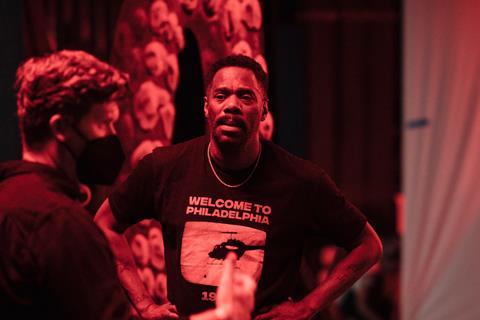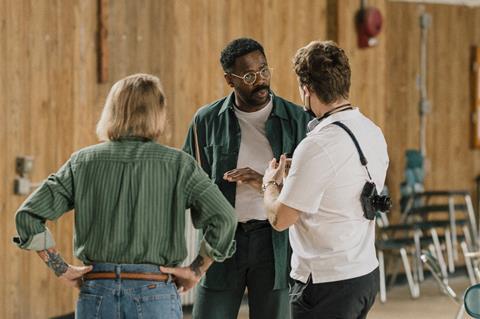Working alongside mostly non-professional actors, Colman Domingo stepped into a mentorship role on the set of Sing Sing.

When Colman Domingo was making The Color Purple in Atlanta, he drove past three penitentiaries on the way to rehearsals. “I had never thought about prisons,” he recalls. “I sort of looked away. It was almost like a stain that you didn’t want to look at because you didn’t want to be there. You didn’t want to know anybody there.”
Not long afterwards, he was making Sing Sing, a story set in the maximum-security prison in New York State. It was an experience that allowed its star and executive producer to develop a more considered view. “When I was given this opportunity to look beyond the walls at these individuals, I realised it was a gift,” he says. “Because these are human beings, and whether we realise it or not, we’re connected to them in some way. It deepened my understanding.
“Not everyone in prison belongs in prison. Yes, some people are there for heinous crimes. But some are there because of the system. So what do we do? Do we just lock them up? Or do we give them tools to actually become healthy, whole individuals.”
Sing Sing is about one such tool, the Rehabilitation Through The Arts programme (RTA), which involves professional teachers leading arts-related workshops inside prisons, with remarkable results: while the rate in the US for inmates returning behind bars is 60%, less than 5% of RTA participants follow the same pattern.
Filmmaking team Greg Kwedar and Clint Bentley focused on the real experience of a group of men performing theatre with the RTA at Sing Sing. Domingo plays John ‘Divine G’ Whitfield, wrongfully convicted of murder, who is the leading light of their endeavours.
“The RTA was a revelation to me,” recalls Domingo, after a day shooting Edgar Wright’s The Running Man at Leavesden Studios outside London. “I just thought, ‘What an incredible programme,’ especially when I heard about the recidivism rate. Here’s something that actually works. I’m a theatre kid. I know the power of theatre and how it transforms, so I care deeply about this.”
The RTA also struck a chord because of Domingo’s first acting job, as a 21-year-old in San Francisco. “My whole career started out with educational theatre. I would tour junior high schools and teach students about conflict resolution or safe sex or whatever, through plays,” he recalls, noting a broad similarity to the work of the prison programme.
Hopeful essence

Though John Whitfield was heavily involved in the production, and shares a ‘story by’ credit, Domingo limited his exposure to the person he was playing to a single Zoom meeting and a face-to-face the night before the start of the shoot.
“I thought it was important that I had some dramatic licence with the character. I knew that I wasn’t interested in mimicry, I had to bring a lot of myself to it as well, to make him a sort of everyman. I think by some strange alchemy you get the essence of the person, a very hopeful human being, even in the darkest of times.”
Domingo collaborated more directly with Clarence ‘Divine Eye’ Maclin, another RTA alumnus, who makes an impressive film debut as the volatile newcomer to the programme. “He has raw talent. I was giving him room to do exactly what he needs to do, but also I would lean into his ear every so often — teaching him how to manage film.”
The dedication paid off, with Domingo and Maclin each collecting Gotham Awards in December, for lead and supporting performance respectively, with nominations for many others, including Baftas. Domingo has earned his second leading actor Oscar nomination for Sing Sing (following last year’s nod for Rustin) — one of three for Kwedar’s film, which was sold internationally by Black Bear and released in North America by A24.
The on-set guidance did not apply to Maclin alone — around 85% of the cast were formerly incarcerated. And, like Whitfield in the film, Domingo found himself leading the troupe. “Life was imitating art,” he agrees. “But I knew what they were capable of. Even leading this film, I knew it could create an incredible ensemble, and I wanted to fold myself into that. I wanted to honour their individual stories in every single way.
“And I did have an opinion on everything,” he continues. “Every frame, setup, bit of writing, the way people were cared for. I think it came from the fact I’m a teacher. This film brought all of that out of me, but doing movies like Rustin and The Color Purple, right before this, set me up to take a larger role. It’s bigger than producer and actor, because I had to affect so many different facets of the film. That’s why I feel closer to this than any other film I’ve made.”
Domingo’s support was crucial when Kwedar, Bentley and producer Monique Walton proposed that every member of the cast and crew earn the same rate, as well as sharing equity. “It couldn’t be done if I was to get my regular salary. And that didn’t make sense to me with this film. The model was put to me and my company [Edith Productions], I brought it to my managers and agents, and they thought I was crazy. But I thought, ‘No, everyone’s taking a chance with this, and it should feel equal’.”
A precedent for the industry? “I think so. A lot of artists believe it’s a healthy way to do it. I question whether other producers are going to follow suit. We’ll see.”
Domingo seems incredibly busy. He suggests that Wright’s The Running Man owes more to the Stephen King novel than the 1987 version starring Arnold Schwarzenegger. Of his own role as TV host Bobby Thompson, he smiles, “I have a whole new bag of tricks.”
Meanwhile, shooting has wrapped on Antoine Fuqua’s Michael, in which Domingo plays Jackson family patriarch Joe Jackson. And having previously directed television and theatre, he is turning his hand to directing films, with two productions this year.
The first will be Scandalous! for Miramax, with Sydney Sweeney and David Jonsson playing the “unrequited love story” between Kim Novak and Sammy Davis Jr. Then there is his untitled musical biopic of Nat King Cole, on which he also serves as co-writer, producer and star.
“Nat King Cole is one of the most incredible artists ever. I like to believe he’s the [Black Panther founder] Huey P Newton of music,” says Domingo. “He’s someone who made such strides for African Americans by being exactly who he is. The perspective I’m taking with this film really does unpack America.”

























No comments yet